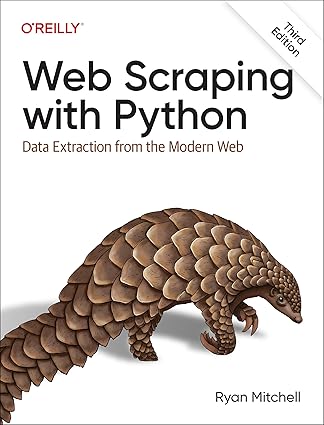Web Scraping with Python: Data Extraction from the Modern Web 3rd Edition
Introduction
Web scraping has become an indispensable tool for extracting data from the modern web, enabling applications in market analysis, academic research, and product development. The third edition of Web Scraping with Python: Data Extraction from the Modern Web provides a comprehensive guide to mastering web scraping techniques, from basic HTML parsing to advanced data extraction strategies. This white paper expands on the book's content by integrating Crawlee, a powerful Python library for web scraping, and exploring its use cases in real-world scenarios.
Crawlee: A Modern Web Scraping Library
Crawlee is an open-source Python library designed to simplify web scraping by providing a unified interface for handling both static and dynamic content. Built on top of BeautifulSoup and Playwright, Crawlee allows seamless switching between HTTP and headless browser crawling, making it adaptable to various scraping needs[1][5].
Key Features of Crawlee:
- Unified Interface: Supports both HTTP and headless browser crawling, enabling flexibility in scraping static and JavaScript-rendered content[1][5].
- Automatic Scaling: Manages concurrency based on system resources and optimizes proxy rotation for efficient scraping[5].
- Type Hints: Modern Python implementation with type hints for improved code completion and bug detection[5].
- Persistent Queue: Handles URLs in breadth-first or depth-first order, ensuring organized and scalable scraping[7].
Use Cases for Crawlee
1. E-Commerce Market Analysis
Crawlee can be used to scrape product details, prices, and reviews from e-commerce platforms. For example, a scraper built with BeautifulSoupCrawler can extract data from static product pages, while PlaywrightCrawler handles dynamic content like user reviews and recommendations[1][3].
from crawlee import BeautifulSoupCrawler
async def main():
crawler = BeautifulSoupCrawler()
async def handle_request(request, page):
product_name = page.select_one('.product-title').text
price = page.select_one('.price').text
print(f"Product: {product_name}, Price: {price}")
2. Academic Research
Researchers can use Crawlee to collect data from academic journals, news articles, or social media platforms. For instance, a scraper can extract article titles, abstracts, and publication dates from a journal website, storing the data in a structured format for analysis[1][8].
from crawlee import BeautifulSoupCrawler
async def main():
crawler = BeautifulSoupCrawler()
async def handle_request(request, page):
product_name = page.select_one('.product-title').text
price = page.select_one('.price').text
print(f"Product: {product_name}, Price: {price}")
3. Travel and Tourism
Crawlee can scrape flight prices, hotel availability, and tourist attractions from travel websites. A scraper using PlaywrightCrawler can navigate through dynamic search results and extract real-time data for price comparison and trend analysis[3][5].
from crawlee import PlaywrightCrawler
async def main():
crawler = PlaywrightCrawler()
async def handle_page(page, request):
flight_info = await page.query_selector('.flight-details').inner_text()
print(f"Flight Info: {flight_info}")
4. SERP (Search Engine Results Page) Scraping
Crawlee can extract search engine results for SEO analysis or competitive research. A scraper can handle pagination and extract metadata like titles, URLs, and descriptions from SERPs[8].
from crawlee import BeautifulSoupCrawler
async def main():
crawler = BeautifulSoupCrawler()
async def handle_request(request, page):
results = page.select('.search-result')
for result in results:
title = result.select_one('.title').text
url = result.select_one('a')['href']
print(f"Title: {title}, URL: {url}")
5. Financial Market Data Scraping
Crawlee can be used to extract stock prices, cryptocurrency data, and financial news for real-time analysis. Using PlaywrightCrawler, traders and analysts can access financial trends efficiently[5][9].
from crawlee import PlaywrightCrawler
async def handle_page(page, request):
stock_price = await page.query_selector('.stock-price').inner_text()
print(f"Stock Price: {stock_price}")
6. Real Estate Data Aggregation
Real estate professionals can use Crawlee to scrape property listings, rental prices, and agent details. A scraper can collect and analyze market trends across different geographic locations[1][6].
from crawlee import PlaywrightCrawler
async def handle_page(page, request):
property_name = await page.query_selector('.property-title').inner_text()
price = await page.query_selector('.property-price').inner_text()
print(f"Property: {property_name}, Price: {price}")
7. News and Social Media Monitoring
Crawlee can be employed to track breaking news, monitor sentiment analysis, and extract data from platforms like Twitter, LinkedIn, or Reddit for trend analysis[3][7].
from crawlee import PlaywrightCrawler
async def handle_page(page, request):
news_title = await page.query_selector('.news-title').inner_text()
print(f"News: {news_title}")
Ethical Considerations and Best Practices
When implementing web scraping, ethical concerns must be addressed:
- Respect Robots.txt: Always check and comply with a website’s robots.txt file.
- Avoid Overloading Servers: Use rate limiting and sleep intervals between requests.
- Handle CAPTCHAs: Implement CAPTCHA-solving services or avoid scraping protected areas.
- Use Proxies and User Agents: Rotate IPs and headers to prevent detection and blocking.
How IAS Research Can Help
IAS Research specializes in advanced data extraction and analysis, providing businesses and researchers with actionable insights derived from web scraping technologies. By leveraging Crawlee, IAS Research can help clients:
- Develop Custom Web Scrapers: Tailor-made solutions for extracting data from diverse sources, including e-commerce, financial markets, and real estate listings.
- Ensure Compliance and Ethical Scraping: Implement best practices to comply with legal and ethical guidelines while maximizing data accuracy.
- Optimize Data Processing Pipelines: Utilize AI-driven methodologies to clean, structure, and analyze large-scale web data efficiently.
- Integrate Scraped Data into Business Intelligence: Transform raw web data into strategic insights for decision-making.
Conclusion
Crawlee enhances the capabilities of the third edition of Web Scraping with Python by providing a robust and flexible framework for building scalable and efficient web scrapers. Its integration with BeautifulSoup and Playwright, combined with features like automatic scaling and proxy management, makes it an ideal choice for a wide range of web scraping applications[1][5][7]. By leveraging Crawlee, developers and researchers can streamline their data extraction workflows and achieve their objectives with greater efficiency and reliability.
References
[1] https://scrapingant.com/blog/crawlee-python-tutorial
[2] https://boulder.marmot.org/Record/.b31351037
[3] https://blog.apify.com/crawlee-for-python-tutorial/
[4] https://www.academia.edu/41461428/Ryan_Mitchell_Web_Scraping_with_Python_COLLECTING_MORE_DATA_FROM_THE_MODERN_WEB
[5] https://crawlee.dev/python/
[6] https://edu.anarcho-copy.org/Programming%20Languages/Python/Web%20Scraping%20with%20Python,%202nd%20Edition.pdf
[7] https://rayobyte.com/blog/crawlee/
[8] https://dokumen.pub/web-scraping-with-python-data-extraction-from-the-modern-web-3rd-edition-3nbsped-9781098145354.html
[9] https://www.scrapingbee.com/blog/crawlee-for-python-tutorial-with-examples/



